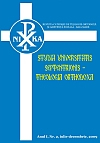Sacrificiul levitic al Holocaustului şi aspectul său tipic în concepţia lui Origen
Levitical sacrifice of al Holocaust and its typical aspect in Origen’s conception
Author(s): Eusebiu BorcaSubject(s): Biblical studies
Published by: Editura U. T. Press
Keywords: The sacrifices; Origen; Leviticus; reconciliation; sacrifice; Son of God; His blood; Jesus Christ;
Summary/Abstract: The sacrifices of Leviticus and his ritual were commanded not from humans but from God Himself. From those sacrifices, the burnt offering (the sacrifice of holocaust) is a salutary offering. Origen thought that this one should be offered only from “man” (entire humanity). The Law of sacrifice command to offer animals (Lev. 1,2.10.14), but just for practicing, and in anticipation of the true and perfect sacrifice of Jesus Christ. The Son of God would offer Himself for the reconciliation of the whole world (Heb. 9.14). Origen claims that animal sacrifices from Leviticus acquired a typical signification. They set forth in shadow that reconciliation which God had determined to effect by giving His Son to death, as a sacrifice for the sin of the whole world was established by His blood. It was not the blood of the animal which took the place of the man, but true sacrifice of Christ (only a human life could atone for a human life). Christ was the ultimate fulfillment, the antitype of the burnt offering, “the Lamb of God” (John 1.29).
Journal: Studia Universitatis Septentrionis. Theologia Orthodoxa
- Issue Year: IV/2012
- Issue No: 2
- Page Range: 91-113
- Page Count: 23
- Language: Romanian

